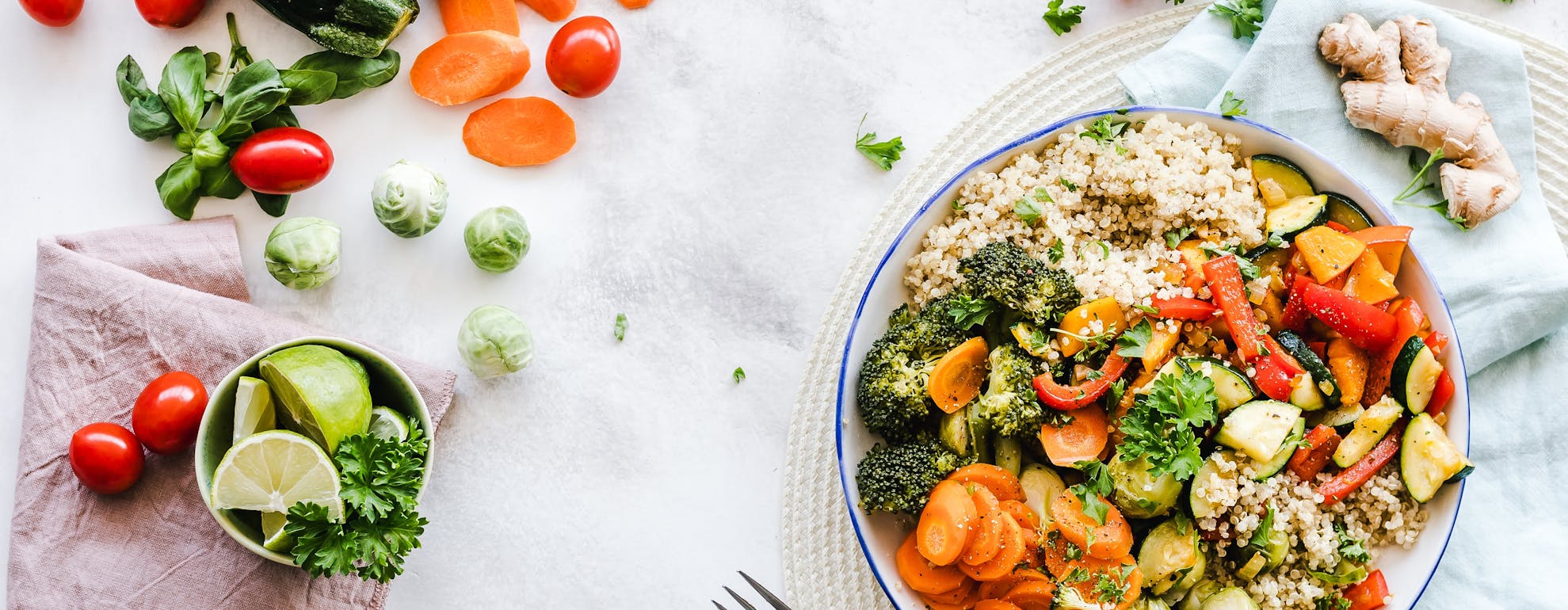
Nutrition
Running Training Nutrition
It is important to be aware of what you eat when training for a long distance run; it is more complicated than simply eating a big bowl of pasta the night before an event and drinking water during a run. Here are our top tips on how to eat to get the most out of your training:
ㅤ
CARB LOADING
Our bodies have an adaptive response which means we can trick our system into storing less glycogen in our fat, and more in the liver and muscles which can then be released as reserves and used to fuel our exercise. This can be triggered by initially depleting carbohydrate intake and increasing training and exertion and then following this with an upload of carbs in the diet.
To achieve this, around one week before a major event, do a longer workout than normal. Maintain carbohydrate levels at a normal level (around 6-7g carbohydrate per kilo /2.2lb of body weight) up until around 3 days before the event, but then for the final 3 days, increase carbohydrates to 10-11g carbohydrates per kilo of body weight.
Therefore if you weigh 64kg (10st 1lb) you should aim for around 384g carbs on a normal diet and 640g carbs when loading for an event.
ㅤ
CARBOHYDRATE VALUES OF FOODS
| FOOD | APPROX CARBOHYDRATE VALUE |
|---|---|
| 1 cup of milk | 12g |
| 1 apple | 15g |
| 1 slice white bread | 15g |
| 1 slice wholegrain bread | 20g |
| 1 cup of cereal or oats | 30g |
| 1 cup of lentils | 30g |
| 1 banana | 40g |
| Large jacket potato | 60g |
| 1 bagel | 70g |
ㅤ
The key is to eat good quality carbs (whole grains, brown rice and pasta, oats), and not processed cakes and biscuits, but more importantly to reduce protein and fat intake proportionally so as not to increase overall calorific intake.
Eating this increased level of carbs can be a challenge, but you can include carb shakes made with bananas and other fruits to help with the totals. Carb loading can also lead to some water retention and bloating but this can actually be an advantage since not only will you have more reserves during activity but you should also be more hydrated.
ㅤ
Fuelling pre, during and post event
The night before
The evening meal the night before is as important as your race day food. Top up your glycogen stores with plenty of carbs (pasta, pizza, rice, vegetables), and some lean protein but beware anything too fatty, spicy, greasy or fibrous which might irritate your gut and be hard to digest.
Race morning
Timing and quantity of food will depend very much on the start time of the event, duration of exercise on your nerves, and also on what you are able to tolerate. Try to eat between 4 and 2 hours prior to a distance race or training session (i.e. exercise lasting more than 90 minutes) and make sure you have a snack about 30 minutes before. The key is to include foods which will give you good levels of carbohydrates to top up stores depleted overnight but foods which you will be able to digest easily quickly.
If you are eating 2 hours before an event, aim for around 3-400 kcals, with around 80% coming from carbs. These can be a mixture of low and high GL varieties to offer both fast and slow releasing energy supplies. Good choices include porridge with some banana, bagels, toast and honey or energy bars. If you are too nervous to eat, opt for a shake. Caffeine can also help enhance performance, delay fatigue and improve your sense of wellbeing, so a cup of coffee can be useful.
During
Glycogen is needed to fuel the brain, muscles and nerves and our stores will only last for about 75 minutes, people running any event lasting longer than this will need to top up their supplies, otherwise they will hit the proverbial wall.
To avoid depletion of glycogen, start snacking from 30 minutes into the exercise and continue to do so a little at a time and often. Opt for quick-releasing carbs so choose jelly babies, carb gels, sports drinks or even dried fruits.
Drinks
Any exercise lasting less than 45 minutes will only need water for hydration but, beyond that and particularly for activity lasting over 1 hour, carbohydrates and electrolytes should be added. Aim to drink 150- 350 ml of fluid for every 20 minutes of exercising, sip little and often, and if you find sports drinks hard to tolerate, try diluting in water.
Post event/training
After distance runs, immediately eat a high energy carbohydrate snack such as jelly babies, an energy bar or a banana, and drink 500ml of fluid within half an hour of finishing. Within 1-2 hours, a meal combining carbohydrate and protein will help with both glycogen replacement and muscle recovery. Egg on toast, a tuna sandwich or a pasta meal would be ideal and bananas and celery are both great for replacing lost electrolytes.
Most importantly, always rehearse your eating plan and meal timings as part of your event training and don't try any new foods or sports drinks for the first time around a big event.
Keen to learn more about fuelling for performance and adventures? Then check out our Nutrition category for more handy tips, advice and recipes.
Welcome
Welcome to the SportsShoes Nutrition Hub! We’ve teamed up with the experts to bring you the very best advice on the best foods to fuel you and your adventures.